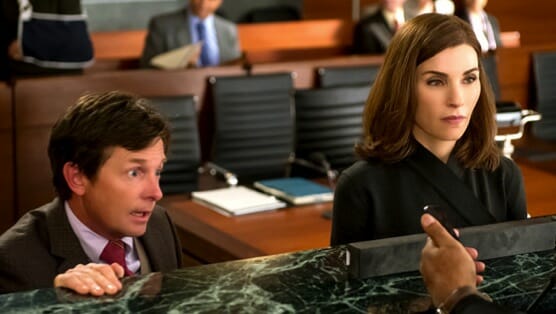The Good Wife: “Red Zone”
(Episode 6.08)

The Good Wife continues to tackle misogyny and feminist issues in another strong installment. I think it’s interesting to note that, almost every week, the series employs a different writer and director, but these important themes have remained prevalent since the premiere. Abortion, public perception of women in politics, and now institutionalized sanctioning of rape have all been addressed, and we’re only eight episodes in.
First, we get a glimpse at old school feminism versus the new school, in the focus group for Alicia’s State’s Attorney campaign. As a woman running, it comes down to whether or not other women respect her relationship politics, not her actual political stances. In the openings scene we see that the older woman in the group understands her decision to stay with the Governor after the scandal, while the younger woman, Sally, scorns her. Class is also an issue, and Alicia cannot shake Sally’s assertion that she is “entitled.”
Cary is the other character struggling in this episode, and he makes two troubling mistakes. Even though he knows that attorneys make the worst witnesses (in part because of their own senses of entitlement), he demands to take the stand. His mock trials are a catastrophe. He also lets his feelings for Kalinda take over, and violates probation to confront her about her other lover, the Fed. I did not enjoy seeing Cary like this… and, in a recent review, I gave Kalinda specific instructions against breaking Cary’s heart. It would appear that she hasn’t been readings my reviews, which is disappointing, to say the least. I also have to say that I did not see her falling for the Fed in such a real way, so this storyline rings a bit false for me. That woman is just… not Kalinda’s type! Plus, hello? Cary is asking you for 14 days of support/monogamy! Give it to him, already!
The other feminist bent to this episode came from the case Alicia took on, against Eli’s wishes (“Oh great, because rape is never controversial”). Un-prosecuted college rape is a huge issue in this country, and we get a glimpse into why this might be so. Alicia’s brother returns (yes, he’s still dating that Palestinian fellow who sometimes does bare-backed gay porn…) and asks Alicia to help his student, a rape victim. And indeed, she needs plenty of help, as the school would rather throw this whole thing under the rug. I loved Alicia in these scenes—she was supposed to be a silent presence at the proceedings, so she started feeding the victim lawyer tips via text.
I also loved that moment when the victim talked about going to those seminars when school first started—seminars that gave her helpful instructions on how to protect herself sexual assault (makes you wonder when they’ll start holding college seminars to help men learn how to stop assaulting women). In the end, they decide to sue. And once they discover that insane “rape wall” on campus, Alicia decides to go for a class action suit against the school. The original victim realizes she’s had enough, once the school expels her attacker for “possession of marijuana” (AKA they found an excuse to get rid of him, without admitting that he raped her, and that they screwed up in their handling of the case). I was disappointed because she seemed like a budding lawyer in the earlier proceedings, but the episode paints an accurate portrait of many victims—it gets to bee too much, and it’s emotionally draining to fight individuals and whole institutions hell-bent on calling you a liar.
In addition to the case, watching Alicia squirm under the gaze of Sally from the focus group was also interesting. Sally is basically a Jezebel-reading, smart, critical woman, and she’s the hardest on Alicia. So, naturally, Alicia wants to win her over.
And, as a result of this storyline, for one of the first times on The Good Wife, I disliked our beloved protagonist. In her scene with Finn she asks him—an entitled guy (or one who’s been accused of such things)—if she’s entitled. Of course he is not going to accuse her of this! Alicia is privileged, and I appreciate that the show draws attention to it. And even though I love this character, I also take pleasure in the moments where she annoys me (like this one). She never gives her entitlement a second thought, but now that she sees it’s costing her something she wants badly, she—like Finn—wants to address it. This isn’t to say she was insincere… but even when you’re scrubbing pots, you’re doing it with privilege, and it shows in the suit you wear, and the cell phone you’re using. Sure, the media took a photo and made up a story, but—as Eli stresses to Alicia— it’s the image that sticks with people:
-

-

-

-

-

-

-

-

-

-

-

-

-

-

-

-

-

-

-

-

-

-

-

-

-

-

-

-

-

-

-

-

-

-

-

-

-

-

-

-








































